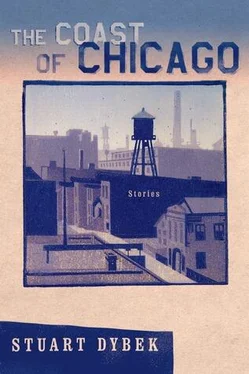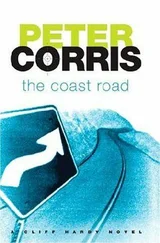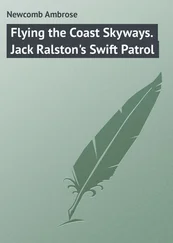Stuart Dybek - The Coast of Chicago - Stories
Здесь есть возможность читать онлайн «Stuart Dybek - The Coast of Chicago - Stories» весь текст электронной книги совершенно бесплатно (целиком полную версию без сокращений). В некоторых случаях можно слушать аудио, скачать через торрент в формате fb2 и присутствует краткое содержание. Год выпуска: 2004, Издательство: Picador, Жанр: Современная проза, на английском языке. Описание произведения, (предисловие) а так же отзывы посетителей доступны на портале библиотеки ЛибКат.
- Название:The Coast of Chicago: Stories
- Автор:
- Издательство:Picador
- Жанр:
- Год:2004
- ISBN:нет данных
- Рейтинг книги:5 / 5. Голосов: 1
-
Избранное:Добавить в избранное
- Отзывы:
-
Ваша оценка:
- 100
- 1
- 2
- 3
- 4
- 5
The Coast of Chicago: Stories: краткое содержание, описание и аннотация
Предлагаем к чтению аннотацию, описание, краткое содержание или предисловие (зависит от того, что написал сам автор книги «The Coast of Chicago: Stories»). Если вы не нашли необходимую информацию о книге — напишите в комментариях, мы постараемся отыскать её.
is a masterpiece from one of America’s most highly regarded writers.
The Coast of Chicago: Stories — читать онлайн бесплатно полную книгу (весь текст) целиком
Ниже представлен текст книги, разбитый по страницам. Система сохранения места последней прочитанной страницы, позволяет с удобством читать онлайн бесплатно книгу «The Coast of Chicago: Stories», без необходимости каждый раз заново искать на чём Вы остановились. Поставьте закладку, и сможете в любой момент перейти на страницу, на которой закончили чтение.
Интервал:
Закладка:
Transport
A kiss crosses the city. It rides a glass streetcar that showers blue, electric sparks along the ghost of a track — a track paved over in childhood — the line that she and her mother used to take downtown.
A kiss crosses the city, revolves through a lobby door into a rainy night, catches a cab along a boulevard of black glass, and, running red lights, dissolves behind the open fans of wiper blades.
Rain spirals colorlessly out of the dark, darkens all it touches and makes it gleam.
Her kiss crosses the city, enters a subway tunnel that descends at this deserted hour like a channel through an underground world. It’s timeless there, always night, as if the planet doesn’t turn below the street. At the mouth of the station stands a kid who’s gone AWOL and now has nowhere else to go, a young conga drummer, a congacero , wearing a fatigue jacket and beating his drum. He has the pigeons up past their bedtime doing the mambo. He leaves his cap of small change behind him on the pavement and steps onto an escalator that carries him down in time to the tock of his drum. The more fervently the congacero drums, the deeper the escalator conveys him. He has it doing a rumba, a cha-cha-cha, a guanguanco , and finally, possessed, unable to fold back upon itself, the escalator becomes a staircase flowing like quicksilver, a shimmering waterfall, an anaconda slithering through the kingdom of sleep. It will transport him deeper than sleep, deeper than dreams, than nightmares, than the nod of junkies, than comas, until he steps off onto the platform where the newly dead, their souls still shaped like their bodies, mill about in confusion, waiting to be taken to their next destination.
“Is anyone in charge here?” the congacero asks, the way a foreigner in a city might seek directions. Despite the mob of souls, his voice echoes as if he’s called into a void. He drums now to invoke whatever spirit governs this place, a beat so compelling that the arrhythmic dead begin to sway as if they feel the accompaniment of their own hearts again.
“ Iku la tigwa un bai bai ,” he chants over his drumbeat, magic words in an ancient tongue that, he’s been taught, will beckon the iku , his dead ancestors, who might intercede for him. But the only response is the hollow silence that his drum continues to punctuate.
The loss of the woman he has descended here to find has taught him that eternity is not a presence, but an absence. His drum shapes silence into time, keeping time where there is none to keep. Time is his song and his power. Drafts from the tunnels swirl about him. In spite of the bone-deep dampness, he’s begun to sweat. Sweat, impossible here as tears, patters the drumskin that he leans above with his eyes closed and drumming hands nearly invisible.
The dead file by dancing jerkily like marionettes, but he doesn’t notice. They stream around him like a rush-hour crowd past a street musician, a musician so absorbed in his intricate rhythms that he’s forgotten the street, and worse, has forgotten how dangerous losing one’s street sense can be. Possessed by his own drumming, he’s become infused with forgetfulness. He has forgotten to drum in supplication to whatever spirit governs this place. He has forgotten to drum for the iku . He has forgotten to dedicate his drumming to his patron saint and guardian, Elleggua, whose necklace of sacred cowrie shells he wears under his fatigue jacket, entangled with his dog tags.
It is for Elleggua, the trickster, Master of Doors and Crossroads, that he should be drumming. Instead, he now drums solely for his lost love, the girl, who, legends say, falls endlessly. One of her perfumed, black nylons is knotted around his head like a sweatband. He has refused to allow his longing for her to turn to grief. The rhythm he weaves for her has never been played before — a slap and swipe of fingertips and palms on the drumskin that evokes the sounds their sweating bodies made against one another. Its ebb and flow is like the lilt of a melody.
His drum song is amplified by the tunnels. Its echoes return delayed almost as if someone far off is at last responding. His conga answers its own echoes. His blurred hands pound still faster and the echoes multiply, first, into a trio of sacred bata drummers, and then into a corps of drummers. He disperses his drum corps in search of her. Their frenzied drumming reverberates down every tunnel as if time is pulsing through the underground like blood, and finally, still dazed, she steps summoned from shadow.
He leads her back from the underground. She follows each beat of his conga as if retracing the footprints of a complicated dance step. The way they walk to the rhythm makes it look as if their hips are leading them. Death has not disfigured her beauty, and yet she wears her youthfulness like a mask. Beneath it, her eyes seem glazed, gazing inward as if completely self-absorbed in her still new, utter lack of self. She is serene and silent as he’s never seen her. What’s been done to you already? he wants to cry, but says nothing. Having glanced at her once, he can’t look back at her again until they have returned to the world of sunlight and substance — a world where sparrows twitter in the sapling that has insisted on sprouting from the rubble of a vacant lot, and the only shadows are those of green awnings unfurled above stands of fruits and flowers.
Even in high heels, she floats so lightly that her footfalls aren’t audible above the scurrying of rats. Yet, he can’t look back to be sure she is following, perhaps because with each step her renunciation of death makes her more terrifyingly beautiful. Or perhaps he doesn’t dare to meet her inwardly gazing eyes for fear they will distract him from the steady, urgent domination of his beat. If his faith in his power to keep time here in the confines of eternity is shaken and his beat disrupted for even a moment they will both be lost.
Think only of light, little dove, he wishes to tell her. Open your memory as if you’ve just awakened and are slowly drawing a window shade up on noon. You’ll return to who you were that moment when I first saw you standing in a doorway, sunlight streaming through your dress, illuminating your legs, the lace petals of your underclothes. In broad daylight, I could see the shadows of your breasts as if my eyes had special power.
But when they reach the knot of tunnels, the confluence of steel and slime where subway track and sewers interconnect, he stops. Still drumming, he stands otherwise motionless at the junction where sinkholes bottom out, and dry wells, abandoned mine shafts, and caverns intersect, then burrow off in all directions. The corridors are dark, a labyrinth of catacombs dropping into chasms and black canyons. His drumbeats collide with blind alleys and dead ends, and the cacophony of so many ricocheting echoes overwhelms him. Suddenly, his hands are confused; he’s not aware at first, that they’ve dropped silently to his sides. The drumming continues without him — incessant, chaotic, shattering time rather than keeping it. Where is his guardian, Elleggua, Master of Crossroads, who should have been his guide? If one’s patron saint is a trickster, must his blessing be a trick? He looks back to tell her he’s lost, but she’s no longer there behind him. And when he turns again, she is standing before him as if she has been leading them, as if she is the one who has led them here. He follows her now, his drum dragging behind him, his eyes on her back as they move off deeper into the twisting passageways. Slowly, he begins to realize that from the start he has not been the one who has done the summoning.
The kiss, blurred on the window of a subway car, rockets by them down a tunnel lit by cobalt switches. The tunnel walls are stained with seepage where the train crosses beneath the river. The conductor’s voice of rattling static calls out the stops where memories disembark and passion and desire are left behind. The walls of the stations the train rushes by are graffitied with names, dates, and epitaphs. The train hurtles past the station where those who died before their time now stand patiently waiting, and past the station of those who waited too long to die. It passes the station of those who died for love, and the jammed station of those who died for lack of love. A cavalcade of shadows open their eyes an instant and reach out to touch the kiss, to catch it on their extended fingertips — fingertips from which the prints have vanished — but the train is already gone, leaving them behind. Tonight, there’s no stopping for loneliness or grief. The third rail, stretched thin, tuned like the string of a violin, senses the ineffable weight of the kiss and seems to shoot forward. Charged with current, the third rail does not belong to the kingdom of the dead, and the kiss follows its path as if tracing a silver thread out of a maze.
Читать дальшеИнтервал:
Закладка:
Похожие книги на «The Coast of Chicago: Stories»
Представляем Вашему вниманию похожие книги на «The Coast of Chicago: Stories» списком для выбора. Мы отобрали схожую по названию и смыслу литературу в надежде предоставить читателям больше вариантов отыскать новые, интересные, ещё непрочитанные произведения.
Обсуждение, отзывы о книге «The Coast of Chicago: Stories» и просто собственные мнения читателей. Оставьте ваши комментарии, напишите, что Вы думаете о произведении, его смысле или главных героях. Укажите что конкретно понравилось, а что нет, и почему Вы так считаете.












